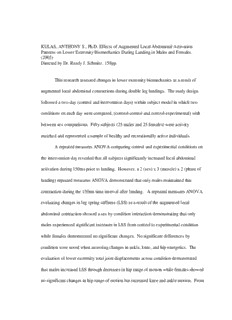
KULAS, ANTHONY S., Ph.D. Effects of Augmented Local Abdominal PDF
Preview KULAS, ANTHONY S., Ph.D. Effects of Augmented Local Abdominal
KULAS, ANTHONY S., Ph.D. Effects of Augmented Local Abdominal Activation Patterns on Lower Extremity Biomechanics During Landing in Males and Females. (2005) Directed by Dr. Randy J. Schmitz. 158pp. This research assessed changes in lower extremity biomechanics as a result of augmented local abdominal contractions during double leg landings. The study design followed a two-day (control and intervention days) within subject model in which two conditions on each day were compared, (control-control and control-experimental) with between sex comparisons. Fifty subjects (25 males and 25 females) were activity matched and represented a sample of healthy and recreationally active individuals. A repeated measures ANOVA comparing control and experimental conditions on the intervention day revealed that all subjects significantly increased local abdominal activation during 150ms prior to landing. However, a 2 (sex) x 3 (muscle) x 2 (phase of landing) repeated measures ANOVA demonstrated that only males maintained this contraction during the 150ms time interval after landing. A repeated measures ANOVA evaluating changes in leg spring stiffness (LSS) as a result of the augmented local abdominal contraction showed a sex by condition interaction demonstrating that only males experienced significant increases in LSS from control to experimental condition while females demonstrated no significant changes. No significant differences by condition were noted when assessing changes in ankle, knee, and hip energetics. The evaluation of lower extremity total joint displacements across condition demonstrated that males increased LSS through decreases in hip range of motion while females showed no significant changes in hip range of motion but increased knee and ankle motion. From these results we concluded that augmented local abdominal activation during a double leg landing task increased LSS by decreasing hip range of motion in males. EFFECTS OF AUGMENTED LOCAL ABDOMINAL ACTIVATION PATTERNS ON LOWER EXTREMITY BIOMECHANICS DURING LANDING IN MALES AND FEMALES by Anthony S. Kulas A Dissertation Submitted to the Faculty of The Graduate School at The University of North Carolina at Greensboro in Partial Fulfillment of the Requirements for the Degree Doctor of Philosophy Greensboro 2005 Approved by Committee Chair To my wife Julie, Your love and support made this accomplishment possible. ii APPROVAL PAGE This dissertation has been approved by the following committee of the Faculty of The Graduate School at the University of North Carolina at Greensboro. Committee Chair Committee Members Date of Acceptance by Committee Date of Final Oral Examination iii ACKNOWLEDGMENTS I wish to acknowledge the patience and motivation from my dissertation advisor, Dr. Randy Schmitz and my entire dissertation committee Dr. Sandra J Shultz, Dr. Jolene M Henning, Dr. David H Perrin, and Dr. Richard M Luecht. iv TABLE OF CONTENTS Page LIST OF TABLES............................................................................................................vii LIST OF FIGURES.........................................................................................................viii CHAPTER I. INTRODUCTION .....................................................................................................1 Statement of the Problem ......................................................................................5 Objectives..............................................................................................................6 Assumptions & Delimitations................................................................................7 Limitations.............................................................................................................8 Operational Definitions..........................................................................................8 II. REVIEW OF THE LITERATURE .........................................................................10 Introduction .........................................................................................................10 Core Stabilization ................................................................................................10 Introduction ..................................................................................................10 Global versus Local Abdominal Function....................................................11 Transversus Abdominis Function.................................................................13 Abdominal Hollowing..................................................................................20 Clinical Evaluation of Abdominal Hollowing..............................................21 Lower Extremity Biomechanics in Double Leg Landings.................................27 Introduction...................................................................................................27 Inverse Dynamics Calculations.....................................................................28 Lower Extremity Joint Energetics................................................................29 Leg Spring Stiffness......................................................................................33 Inter-Relationships between Leg Spring Stiffness and Joint Energetics......34 Kinetic Chain Approach to Understanding Human Movement..........................37 Introduction...................................................................................................37 Biomechanical Performance Assessment.....................................................37 Postural Control............................................................................................40 Core Stabilization and Kinetic Chain Function............................................43 Summary.............................................................................................................46 III. METHODS...............................................................................................................48 Design.................................................................................................................48 Subjects...............................................................................................................49 v Instrumentation...................................................................................................49 Procedures...........................................................................................................50 Data Processing and Independent & Dependent Variable..................................55 Statistical Analyses.............................................................................................59 IV. RESULTS.................................................................................................................61 Abdominal Hollowing Performance...................................................................61 Leg Spring Stiffness............................................................................................64 Lower Extremity Energetics...............................................................................64 V. DISCUSSION...........................................................................................................69 Abdominal Activation Patterns between Sexes..................................................69 Influence of Increased Local Abdominal Activation on Lower Extremity Biomechanics....................................................................................................74 Clinical Relevance of the Kinetic Chain for Injury Risk and Prevention...........81 Future Studies.....................................................................................................84 Conclusion..........................................................................................................87 REFERENCES .................................................................................................................88 APPENDIX A. LANDING ACTIVITY QUESTIONNAIRE ......................................101 APPENDIX B. SPSS OUTPUTS & SYNTAX FOR HYPOTHESIS #1 .....................102 APPENDIX C. SPSS OUTPUTS & SYNTAX FOR HYPOTHESIS #2......................104 APPENDIX D. SPSS OUTPUTS & SYNTAX FOR HYPOTHESIS #3 ....................110 APPENDIX E. SPSS OUTPUTS & SYNTAX FOR HYPOTHESIS #4......................115 APPENDIX F. SPSS OUTPUTS & SYNTAX FOR HYPOTHESIS #5 .....................119 APPENDIX G. POWER ANALYSIS TO ESTIMATE SAMPLE SIZE......................132 APPENDIX H. ACTIVITY MATCHING SPREADSHEET........................................133 APPENDIX I. IRB APPROVAL FORM.....................................................................134 APPENDIX J. CONSENT FORM...............................................................................135 APPENDIX K. DATA SETS........................................................................................138 vi LIST OF TABLES Page Table 1 Recreational Levels and Activity Matching.....................................................49 Table 2 Reliability and Precision of Surface EMG during Abdominal Hollowing.......54 Table 3 Means +/- Standard Deviations for TrA-IO Preactivation Ratios....................62 Table 4 Means +/- Standard Deviations for Leg Spring Stiffness.................................64 Table 5 Average Powers Across Day, Joint, Landing Phase, and between Sex............68 Table 6 Means +/- Standard Deviations for TrA-IO Post-Impact Ratios......................72 Table 7 Estimated Marginal Means for Average Powers Across Day..........................81 vii LIST OF FIGURES Page Figure 1 The Abdominal Hoop Mechanism (Adapted from McGill, 2002)................17 Figure 2 Abdominal Hollowing in Supine to Monitor Lumbar Pressure.....................21 Figure 3 Prone Quantification of Abdominal Hollowing.............................................22 Figure 4 Abdominal EMG Setup and Clinical Positions to Instruct AH.....................54 Figure 5 Changes in Abdominal EMG Ratios Across Muscle** & Phase in Males...63 Figure 6 Changes in Abdominal EMG Ratios Across Muscle** & Phase in Females........................................................................................................63 Figure 7 Average Powers Across Sex, Joint, and Phase for Day 1..............................66 Figure 8 Average Powers Across Sex, Joint, and Phase for Day 2..............................67 viii
Description: